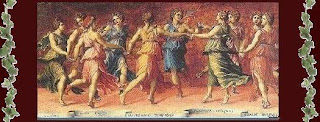Tuesday, June 15, 2010
The Nine Muses
I've dabbled in the arts, theater, music and song. Now I write. Legends and lore and superstitions are the backbone of who I am. I believe in hopes and dreams and the sweet hereafter. I believe in the sisters of inspiration. I present to you:
The Nine Muses
The muses are a sisterhood of goddesses or spirits; their number set at nine by Classical Times. They embody the arts and inspire the creative process with their graces through remembered and improvised song and stage
Writing
Traditional music
and dance
They were water nymphs associated with the springs of Helicon
Apollo was their leader
Their father Zeus was king of the gods
And
Mnemosyne their mother goddess of memory
The muses are used in modern literature to refer to an inspiration as when one one cites his or her own artistic muse, but they are also implicit in the word amuse or musing
Muse means the one who remembers
They are the daughters of the titan Mnemosyne who is the personification of remembrance
All nine muses have a science or an art to protect
In sculptures and art they are depicted with emblems for recognition
Cleo
The glorious one
Muse of history
Protects the stories of heroes
History: carries a scroll and book
Urania
The celestial one of heavenly beauty
Protects astronomy and soars amidst the moon and stars in the seven heavens.Depicted pointing a staff at a celestial depicted with staff and globe
Calliope
The muse of beautiful speech
Oldest and chief muse
Muse of epic or heroic poetry
Elegies
Epic poetry carries a writing tablet
Melpomene
The chanting one
The tragedies
Depicted wearing a mask
Euterpe
The well pleasing one
Muse of music and lyric poetry
Flute playing
Carries a flute
Erato
The amorous one
Muse of erotic poetry, lyrics or marriage songs
Love poems
The amorous one
Muse of erotic poetry
Depicted with a lyre and a crown of roses
Terpsichore
The one who delights in dance
Muse of coral
Song and Dance
Depicted dancing and carrying a lyre
Thalia
Muse of comedy and pastoral poetry
Protecter of comedies and bucolic poetry
Polyhymnia
Singer of hymns
Muse of sacred songs, oratory, lyric, s singing and rhetoric
Sacred poetry
Depicted with a pensive expression
The muses love to sing and dance and they sing gorgeously
They are superior in musical competitions and anyone who dares and challenge them will always fall short—just as anyone who questions their importance.When they compete against the Siren, the muses always win. A father challenged the muses to compete with his daughters.When the muses won, they changed the daughters into crows to spite the father.
The poet Thamyris bragged about being able to remember all of his work without the help of the muses as poets back then did not write their work down but remembered it by heart. The muses punished him by taking his memory and eyesight.They are often led by the god of music Apollo and entertain at Olympus
Cleo
the proclaimer, muse of history and glorious words.
The goddess Urania, the celestial one of heavenly beauty, muse of astrology.
The noble Calliope, goddess of eloquence and epic poetry.
The Greek goddess Melpomene, songstress of tragedy.
The amorous Erato, musical muse of erotic poetry.
Euterpe, muse of music and lyrical poetry.
Polyhymnia, goddess of reverent hymns, muses over sacred poetry.
Terpsichore, muse of coral,song and dance.
Thalia, muse of comedy and pastoral poetry.
The Nine Muses
The muses are a sisterhood of goddesses or spirits; their number set at nine by Classical Times. They embody the arts and inspire the creative process with their graces through remembered and improvised song and stage
Writing
Traditional music
and dance
They were water nymphs associated with the springs of Helicon
Apollo was their leader
Their father Zeus was king of the gods
And
Mnemosyne their mother goddess of memory
The muses are used in modern literature to refer to an inspiration as when one one cites his or her own artistic muse, but they are also implicit in the word amuse or musing
Muse means the one who remembers
They are the daughters of the titan Mnemosyne who is the personification of remembrance
All nine muses have a science or an art to protect
In sculptures and art they are depicted with emblems for recognition
Cleo
The glorious one
Muse of history
Protects the stories of heroes
History: carries a scroll and book
Urania
The celestial one of heavenly beauty
Protects astronomy and soars amidst the moon and stars in the seven heavens.Depicted pointing a staff at a celestial depicted with staff and globe
Calliope
The muse of beautiful speech
Oldest and chief muse
Muse of epic or heroic poetry
Elegies
Epic poetry carries a writing tablet
Melpomene
The chanting one
The tragedies
Depicted wearing a mask
Euterpe
The well pleasing one
Muse of music and lyric poetry
Flute playing
Carries a flute
Erato
The amorous one
Muse of erotic poetry, lyrics or marriage songs
Love poems
The amorous one
Muse of erotic poetry
Depicted with a lyre and a crown of roses
Terpsichore
The one who delights in dance
Muse of coral
Song and Dance
Depicted dancing and carrying a lyre
Thalia
Muse of comedy and pastoral poetry
Protecter of comedies and bucolic poetry
Polyhymnia
Singer of hymns
Muse of sacred songs, oratory, lyric, s singing and rhetoric
Sacred poetry
Depicted with a pensive expression
The muses love to sing and dance and they sing gorgeously
They are superior in musical competitions and anyone who dares and challenge them will always fall short—just as anyone who questions their importance.When they compete against the Siren, the muses always win. A father challenged the muses to compete with his daughters.When the muses won, they changed the daughters into crows to spite the father.
The poet Thamyris bragged about being able to remember all of his work without the help of the muses as poets back then did not write their work down but remembered it by heart. The muses punished him by taking his memory and eyesight.They are often led by the god of music Apollo and entertain at Olympus
Cleo
the proclaimer, muse of history and glorious words.
The goddess Urania, the celestial one of heavenly beauty, muse of astrology.
The noble Calliope, goddess of eloquence and epic poetry.
The Greek goddess Melpomene, songstress of tragedy.
The amorous Erato, musical muse of erotic poetry.
Euterpe, muse of music and lyrical poetry.
Polyhymnia, goddess of reverent hymns, muses over sacred poetry.
Terpsichore, muse of coral,song and dance.
Thalia, muse of comedy and pastoral poetry.
Subscribe to:
Post Comments (Atom)

























3 comments:
Great post. I've always heard about these muses, it was nice to get some details about them!
Hi Debra, glad you enjoyed the history lesson. LOL I was rather curious a while back and did a bit of research for my favorite hobby of legends and lore!
Shar
Post a Comment